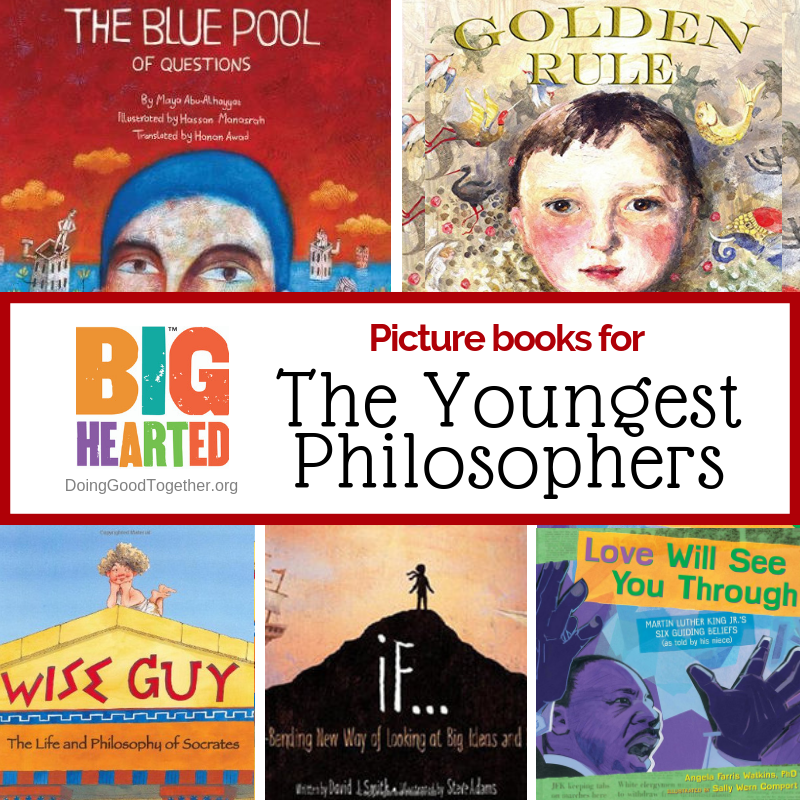The Inner Work of Childhood
How (and Why) To Become a Family of Philosophers
This summer, let’s give our children the time and the presence to tackle what I like to call the inner work of childhood.
And just what is the inner work of childhood, you might be asking?
There is a certain amount of “Who am I?” and “Why are we here?” work that needs to happen during our early years. This “work” often takes place organically when children have time enough to play, to be bored, and to explore and experiment with the world around them.
And of course, children need time to grapple with all of their many questions.
At Doing Good Together, we have found that a great deal of this inner work happens when kids have the opportunity to ask big questions with adults in their lives. Patient adults. Curious adults. Adults who make time to help kids work through their big ideas.
Let’s face it, the modern world is ready and waiting to tell our children exactly what kind of consumers, competitors, and worker bees they should be. A fleet of flashy distractions – aka screens – are ready and waiting to take the place of their curiosity. And the rapid pace of family life in the age of over-scheduling steals away time to wonder.
If children aren’t given an opportunity to do the inner work of childhood, through free play and inquiry, the “who am I?” and “why are we here?” work of childhood will be done for them.
As fans of Doing Good Together’s mission, you and I both know that life holds more meaning than that of consumers, competitors, and worker bees.
To help kids tend to their inner lives, we need to give them as much unplugged, unbusy time as we can. And we need to be present for their big, complicated questions.
Let’s help our children develop the skills to live a more meaningful life. Become a family of philosophers, a family that routinely asks – and explores the answers to – big questions together.
That’s right. I’m suggesting you spend some of your precious free time exploring philosophical questions with your kids.
I know. I hear your skepticism. These same kids still leave notes for their tooth fairy. Or maybe they are more likely to debate the merits of Netflix’s latest season of Cupcake and Dino than inquire about the meaning of life. That’s okay. They may be young, but they are up to it. Children have a remarkable capacity for deep thinking when we give them the opportunity.
Philosophy isn’t meant to be relegated to elbow-patched professors on far away college campuses. It was born when people first began asking questions, nurturing a sense of wonder, and examining difficult subjects from many perspectives. These are life skills we can – and should – begin building at home.
Science-Backed Reasons your Family Should Dabble in Philosophy
The study of philosophy is good for kids. The Education Endowment Foundation (EEF) recently released an evaluation of Philosophical Enquiry with Children, a targeted program to bring philosophy into schools. The study found that, when philosophy and inquiry were taught routinely, participants enjoyed greater advances in math and reading skills, as well as increases in confidence, listening skills, patience with other children, and overall self-esteem. Though not every school is taking up this curriculum, any family can bring the strategies of philosophical inquiry into their homes.
The study of philosophy teaches empathy. One recent study run by Dr Kirstine Szifris of Manchester Metropolitan University found that hardened criminals became more tolerant and empathetic after participating in a 12-week course in classic philosophy. This makes sense. Grappling with philosophical ideas requires questioners to consider diverse perspectives, which is fundamental to developing empathy.
The study of philosophy teaches open-mindedness and critical thinking. We all need to work on our ability to take in information, ask additional questions, and reform our understanding of the world based on this new information. And according to the experts, the study of philosophy hones these skills, even for very young thinkers.
To teach kids philosophy is to give them the ability to dig in to serious long-standing questions with curiosity. It is to invite them to weigh in on issues that have confounded the greatest minds in history.
Making time to explore life’s most persistent questions allows kids to construct a sense of self sturdy enough to withstand the forces of the modern world, while teaching them to become lifelong students, even when they encounter ideas they find challenging.
As the incomparable Maria Popova, creator of Brain Pickings, writes, “In order for us to truly create and contribute to the world, we have to be able to connect countless dots, to cross-pollinate ideas from a wealth of disciplines, to combine and recombine these pieces and build new castles.”
Let’s make time to explore new – and ancient –ideas with our children so that we might, together, learn to combine and recombine the pieces of what we learn into something new.
These skills will be essential for our children as they grow to become the leaders and builders of tomorrow, and may even inspire us parents to discover something new about ourselves and the world.
Tips for Your Inspiring Your Family of Philosophers
1. Build A Luscious Library
Any good philosophical discussion has its origins in a great book. At least, that’s been my experience. I’ve rounded up gems for two book collections sure to inspire some interesting discussions. Choose your favorites and get started.
2. Know the Rules of Philosophy Club
First, let your kids know what you are up to. Say something like, “I’ve got this interesting new book. I’d love to read and talk about it together.” After that, the rules are simple:
Ask lots of questions.
Try to think of a variety of different answers, and consider whether you agree with them or not.
Be sure to listen to one another.
3. Make Inquiry Inviting
Make it a party! You may want to offer an inviting snack, light a candle, or put on some relaxing music. Adding a ritual or two to your conversations just might turn them into something your children look forward to.
Also, choose your timing carefully. Take a moment to recall your last thoughtful conversation with your kids. Big questions tend to bubble up in places, and at times, when your child is feeling most relaxed and comfortable. Were you in the car? On a walk? Reading books at bedtime? If so, choose a similar time and place to launch your family philosophy discussion.
4. Make Philosophy Part of Your Family Life
Here are a few ways to stay curious together as a family:
Set up an “I Wonder” Wall, to hold on to big questions you want to come back to when you have more time.
Revisit our popular newsletter, “Cultivating Wonder and Awe in our Children”
Revisit our classic article, “I Wonder: Tools to Inspire Curiosity, Empathy, and Reflection in Kids”
4. Nurture Your Own Inner Life
Philosophy is not an abstract exploration of ideas. It’s a way of living in the world. By considering your own answers to life’s big questions, you’ll be able to role model a philosophically thoughtful life in your everyday interactions. Your children will learn from your philosophy in the way you react to other drivers on the road, or respond to people experiencing homelessness.
Of course, all of this is simply a reminder to spend more time in the expansive wilderness of questions rather than the tidy hedgerows of answers.
Let’s make time to teach our children’s hearts to love asking questions, so that they may become thoughtful adults. Let’s teach them to explore their worlds, both the tangible and the intangible, with curiosity and wonder.
Still looking?
Browse our collection of big-hearted books, each with a set of though-provoking conversation starters.
If you like our free resources, you'll love our membership program! Join today and we'll help you keep kindness on your family calendar all year long
Disclaimer: Doing Good Together™ is a participant in the Amazon Services LLC Associates Program, an affiliate advertising program designed to provide a means for sites to earn advertising fees by advertising and linking to Amazon.com.
The recommendations we offer are based solely on our mission to empower parents to raise children who care and contribute.







